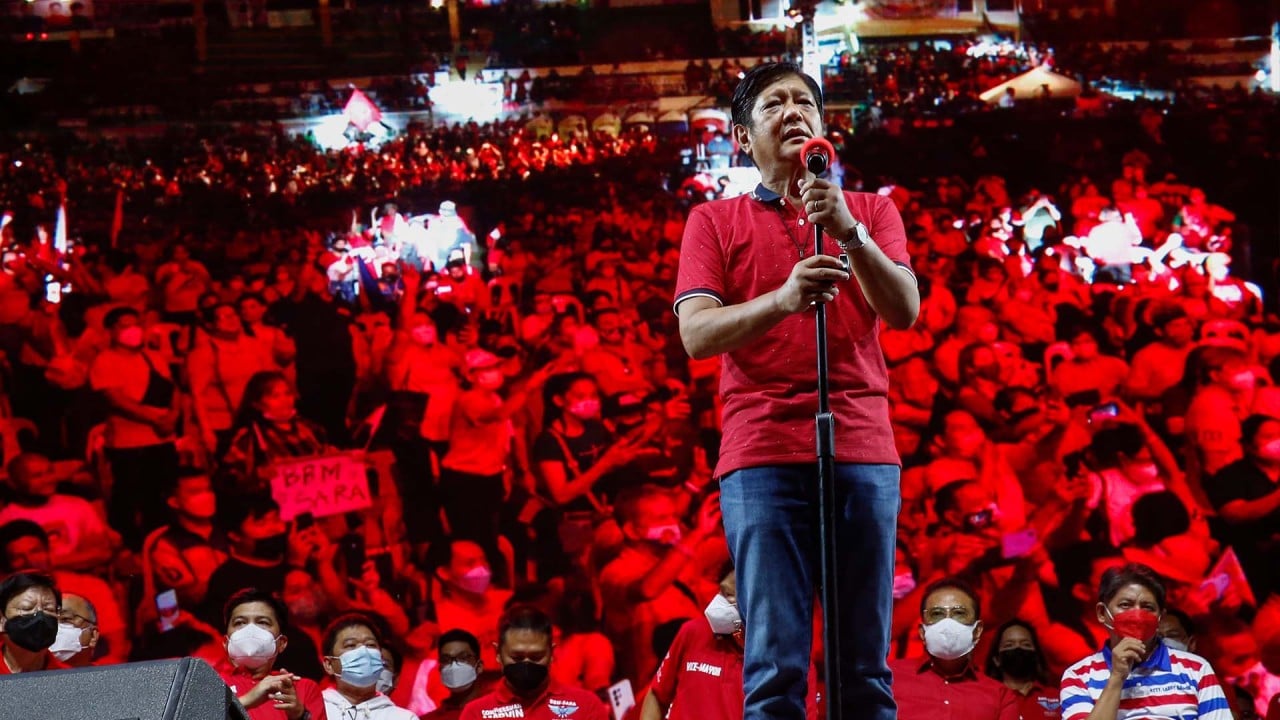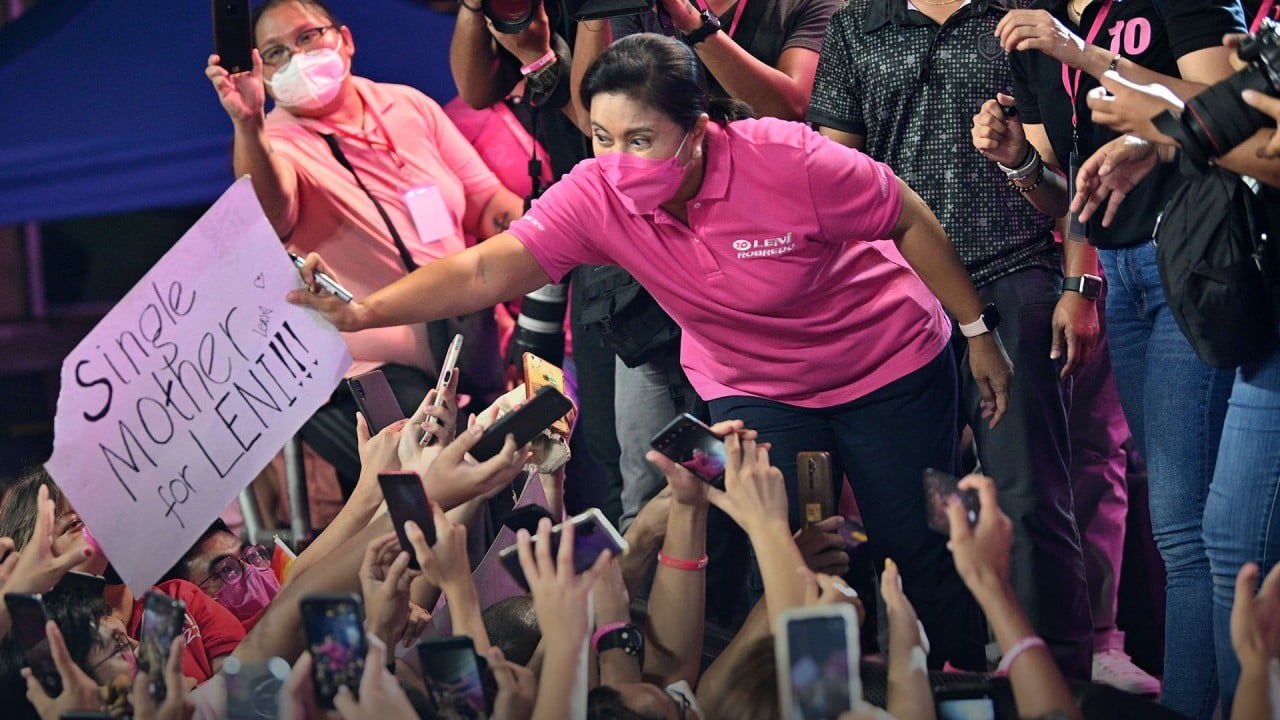
Philippine election: Who is Bongbong Marcos, what has he said about China, and why can’t he visit the US?
- The presidential frontrunner and son of dictator Ferdinand Marcos doesn’t have a clear platform and has few views on China, although he has repeated the word ‘unity’ in rallies
- If he wins, he’ll be the first Philippine leader who cannot set foot in the US, where he and his family face arrest for defying a court order to pay US$353 million to human-rights victims
Ferdinand “Bongbong” Marcos Jnr, the frontrunner in the Philippines’ presidential election on May 9, claims he never wanted to become a politician.
“I was really avoiding politics,” the son and namesake of dictator Ferdinand Marcos told CNN Philippines in a rare interview last month. People had been urging him to enter politics since he was a teenager but “I didn’t want to do it because my father had already done it”.
Why Philippines’ Marcos Jnr is wary of debates in presidential election
Marcos Snr in 1972 ran a martial law regime that jailed, tortured and killed many Filipinos, and looted the country of billions of dollars, which the dictator and wife Imelda used to amass artworks, gems and US properties until a “people power” uprising in 1986 pushed him into exile in Honolulu, where he died.
Decades later, Marcos Jnr, himself a convicted tax evader, is the strong favourite to win the presidency. A survey by Pulse Asia this week showed 56 per cent of 2,400 respondents backed him, while 24 per cent supported his closest rival, current Vice-President Leni Robredo.
While much is known about the late Marcos patriarch and his family, who is 64-year-old Bongbong Marcos and what have others said about him?
A high-school graduate
Before entering politics, Marcos Snr was a law graduate from one of the country’s top schools, the University of the Philippines. He aced the bar exams and became a congressman at 32, a senator 10 years later, president at age 48 in 1965, authoring several books along the way.
His son’s academic career was not as noteworthy. Marcos Jnr went to the University of Oxford in Britain to study a degree in philosophy, politics and economics but did not graduate, earning only a special certificate of attendance. He later went to Wharton Business School in the US, but did not finish the course.
What’s behind the Philippines’ love for political princelings?
During his father’s dictatorship, Marcos Jnr was vice-governor and then governor of Ilocos Norte province in northern Philippines. From 1992 to 2016, he held elected positions as provincial governor, congressman and finally as senator. He is viewed as a weak orator, rambling in some rallies ahead of the election.
In 1975, dictator Marcos Snr gave a glimpse of his family in an interview with former journalist Paulynn Sicam.
“The most memorable part of our conversation was when I asked him to describe his children,” Sicam wrote later in a column for a national newspaper. “Imee, he said, was his ‘intellectual twin’. Irene was everyone’s sweetheart. And Bongbong? The strongman thought long and hard. Then he said: ‘He has good muscle coordination’.”
A son’s rise: overseas Filipinos throw their support behind Marcos Jnr
President Rodrigo Duterte has disparaged Marcos Jnr, calling him a “spoiled brat” and “weak”. In his CNN interview, Marcos Jnr dismissed Duterte’s remarks, saying “I think it was plain politics … (Duterte) likes to keep everyone on their toes”. Marcos Jnr’s running mate for vice-president is Duterte’s daughter, Sara Duterte-Carpio.
People who have met Marcos Jnr describe him as affable. Businessman Rafael Ongpin said he was “a nice guy, jovial” but that Marcos Jnr’s wife Louise Cacho-Araneta “has more character and competence”.
“She’s the actual professional in the family,” said Ongpin, a family friend of Cacho-Araneta. “If she were running for president she’d be an excellent candidate.”
Vague campaign
Running for vice-president in 2016, he appeared in a TV news show where the presenter challenged him to answer a quiz consisting of 16 general questions about the Philippines. He got seven correct answers, failing among other things to give the correct number of associate justices of the Supreme Court, and the minimum fare for a jeepney ride in Manila.
He won’t be making any of those mistakes in this campaign, simply because his handlers have kept him away from TV shows, hard-hitting interviews, and presidential debates since he threw his hat in the ring. The guards around him have roughly pushed aside reporters attempting to question the candidate.
If he wins the election he would be the first Philippine president unable to travel to the US, where he faces possible arrest: he and his family are in contempt of US$353 million for ignoring a US court decision to compensate Filipino human rights victims.
Trolls and polls: fake news surrounds Philippines’ Robredo-Marcos showdown
But if there’s anything Marcos Jnr can count on, it is his family name and his large social media following.
Of the country’s 110 million people, about 70 per cent are active social media users, making digital channels an important avenue to reach out to voters.
Marcos Jnr’s YouTube channel, started in 2009, has 2.21 million subscribers and a total of 107 million views. In the videos, he comes across as friendly, goofy and approachable.
Three students from Ateneo de Manila University watched and transcribed 40 of Marcos Jnr’s videos – starting from when he announced his candidacy – as part of a thesis on political imagery.
Asking not to be named, one of the students said: “We found five main topics he talks about: unity, co-operatives, energy, China, and the Marcos dynasty. We noticed there seems to be some sort of vagueness in his message of unity, which makes it especially easy for his supporters to remember.”
The student noted that “the vagueness of his messaging, the victim mentality, clever advertisements, a massive audience and his family name has helped him amass a lot of supporters”.
The student added Marcos Jnr “does not want to go against China, and he states that he wants to work with them”.

A disinformation network
Marcos Jnr’s YouTube account contains disinformation and fake news about the Marcos dynasty and his fellow presidential candidates, according to an observer.
Despite an abundance of evidence to the contrary, there are millions of Filipinos convinced that the brutal and repressive Marcos dictatorship was an economic “golden age”.
Marcos Jnr has constantly rejected criticism about his father’s dictatorship even as hundreds of millions of dollars of family assets, including hidden wealth, artwork, jewels and properties, have been recovered.
When more than US$600 million that the Marcoses stashed in Swiss banks was returned to the Philippines in 2013, part of the amount was used to compensate human rights victims. Marcos Jnr himself has been convicted of evading taxes and for years ignoring a bill from the government for billions of pesos on his family’s estate.
What he stands for is the legacy of his father, which Filipinos are reaffirming as something they want
Jonathan Corpus Ong, a disinformation researcher at Harvard University, said Marcos Jnr’s online following comes from “the cumulative impact of six years of building up disinformation networks”.
“Influencers, vloggers, meme pages, and parody pages are mobilised to post memes and videos whose goal is to rebuild the Marcos brand and make sure it appeals to diverse demographics – including younger people who did not grow up during martial law,” said Ong, the author of Architects of Networked Disinformation.
Marcos Jnr’s YouTube following comes as the platform has “surpassed Facebook in the Philippines in terms of number of hours spent by the average Filipino”, according to Ong.
Part of the appeal was its versatility – “YouTube content can be remixed to TikTok”, an app for bite-sized videos with a much younger user base. This means that whereas some YouTube vloggers might appeal to older people, “the TikTokers that remix YouTube videos target younger communities”, Ong said.
Can Robredo’s ‘pink wave’ reverse the Marcos tide in Philippine poll?
The researcher said what supporters were voting for was the “the Marcos brand” rather than Marcos Jnr himself.
“What he stands for is the legacy of his father, which Filipinos are reaffirming as something they want,” he said.
While Marcos Jnr looks poised to win, all eyes are on whether the preferential polls will translate into real votes. Businessman Ongpin observed: “Nobody who ranked highest in a survey before an election has ever gone on to win the election.”



